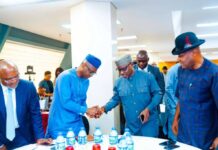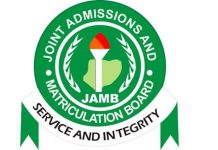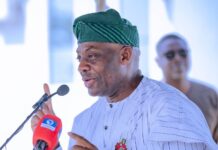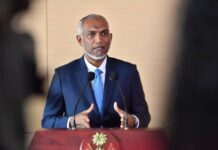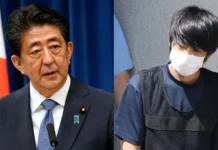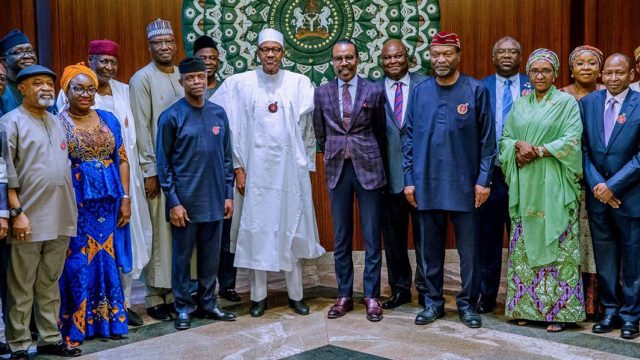
Ime Akpan
We’ll resist it -Wabba
The new minimum wage that is in the works may not go down well with some category of workers as President Muhammadu Buhari has dropped a hint that the pay of federal government workers whose packages are already above the N30, 000 new minimum pay demanded by the organised labour will be reviewed.
Workers who are likely to be affected are those in revenue generating ministries, departments and agencies the Central Bank of Nigeria (CBN), Federal Inland Revenue Service (FIRS), Nigerian National Petroleum Corporation (NNPC), Department of Petroleum Resources, mong others.
Inaugurating the Technical Advisory Committee on the Implementation of a New National Minimum Wage in Abuja yesterday, the president put such worker on notice saying it is important to prepare the minds of those to be affected — that a windfall is not on the way — so as not to be caught unawares.
The president named an economist, Mr. Bismarck Rewane, as chairman of the committee.
Others on board from the private sector are former chairman of the Federal Inland Revenue Service (FIRS), Mrs. Ifueko Omoigui-Okauru, as well as Sulieman Barry, Dr Ayo Teriba, and Prof. Akpan Ekpo.
From the public sector are the chairman of FIRS, Dr. Babatunde Fowler; director, general of budget office, Mr. Ben Akabueze as secretary; representative of the Nigeria Governors Forum (NGF); chairman of the National Salaries, Incomes and Wages Commission, Mr. Richard Egbule; permanent secretary, service welfare office of the head of service of the federation, Mrs. Didi Walson-Jack; permanent secretary general service office, office of the secretary to the government of the federation, Mr. Olusegun Adekunle; permanent secretary ministry of finance, Dr. Mahmoud Isa-Dutse; permanent secretary ministry of budget and national planning, Mr. Olajide Odewale; permanent secretary ministry of labour, Mrs. Ibukun Odusote, and the solicitor general of the federation and permanent secretary ministry of justice, Mr. Dayo Apata.
Others are Special Adviser to the president on economic matters, office of the vice president, Dr. Adeyemi Dipeolu; deputy governor of the Central Bank of Nigeria (CBN), economic policy, Dr. Joseph Nnanna; accountant general of the federation, Mr. Ahmed Idris; director general, debt management office, Ms. Patience Oniaga; director general, National Institute of Social and Economic Research (NISER), Dr. Folarin Gbadebo-Smith; statistician general, National Bureau of Statistics (NBS), Dr. Yemi Kale; Mrs. Aisha Hamad; Mamman Garba and Tunde Lawal.
The president said government would begin talks with the workers after the new minimum wage Bill must have been passed into a law.
The inauguration came barely 24 hours after the government and Labour agreed that a New National Minimum Wage Bill will be sent to the National Assembly on or before January 23.
The committee’s terms of reference are: “To develop, and advise government on how to successfully bring about a smooth implementation of impending wage increases;
“Identify new revenue sources, as well as areas of existing expenditure from where some savings could be made in order to fund the wage increases without adversely impacting the nation’s development goals as set out in the Economic Recovery and Growth Plan;
“Propose a work plan and modalities for the implementation of the salary increases;
“Any other suggestions that will assist in the implementation of this, and future wage increases.”
Addressing the committee, the president declared: “It is important to explain that even though the subject of a National Minimum Wage is in the Exclusive Legislative List, we have been meeting with the state governors because it is imperative that the federal government carries the state governments along in determining any upward review of the minimum wage for workers.
“This is especially necessary considering the prevailing public sector revenue challenges, which have made it extremely difficult for some of the governments to pay workers as and when due.
“As you know we, at the federal level, have made adequate provision for the increase in the minimum wage in our 2019 budget proposals which we submitted to the national assembly.
“Therefore, we will be able to meet the additional costs that will be incurred in moving up all personnel who are currently earning below the new minimum wage.
“However, we anticipate that after the new minimum wage has been passed into law, we will be going into negotiations for salary review for all the workers who are already earning above the new minimum wage. It is, therefore, important that we are properly prepared to meet these demands.”
Meanwhile, the president of the Nigeria Labour Congress (NLC), Mr. Ayba Wabba said labour will resist the proposed cut in the wages of workers in the revenue generating MDAs.
He said there is nowhere in the world that introduction of new minimum wage will cause a reduction in workers’ legitimate workers.
“That is not the principle behind the minimum wage and the technical committee is simply a government committee. It is their internal mechanism. I am not so sure that minimum wage is about reducing workers wages.
“If they have earned their salaries legitimately, there is no way the minimum wage can reduce it. In fact the minimum wage is about empowering workers and improving on what they collect. I don’t think that decision is right because every salary a worker earns is legitimately negotiated on the table.
“I think what they need to do is to reduce salaries of political office holders, those that are collecting salaries that are not appropriated or salaries that are humongous. We know the wastages are the security votes and the high cost of governance,” he said.


